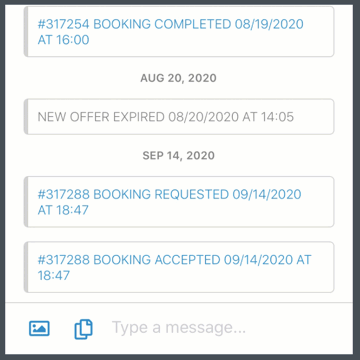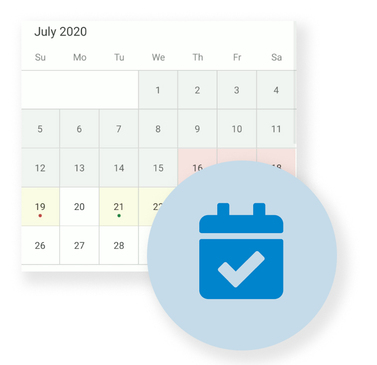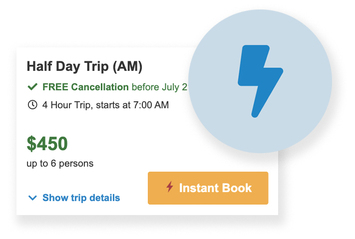As a captain on FishingBooker, there are many things you can do to make your business stand out. Some are cosmetic, while others are more substantial. In this article, we’ll explain one of the most important elements of your listing’s success – turning your bookings into fishing trips.
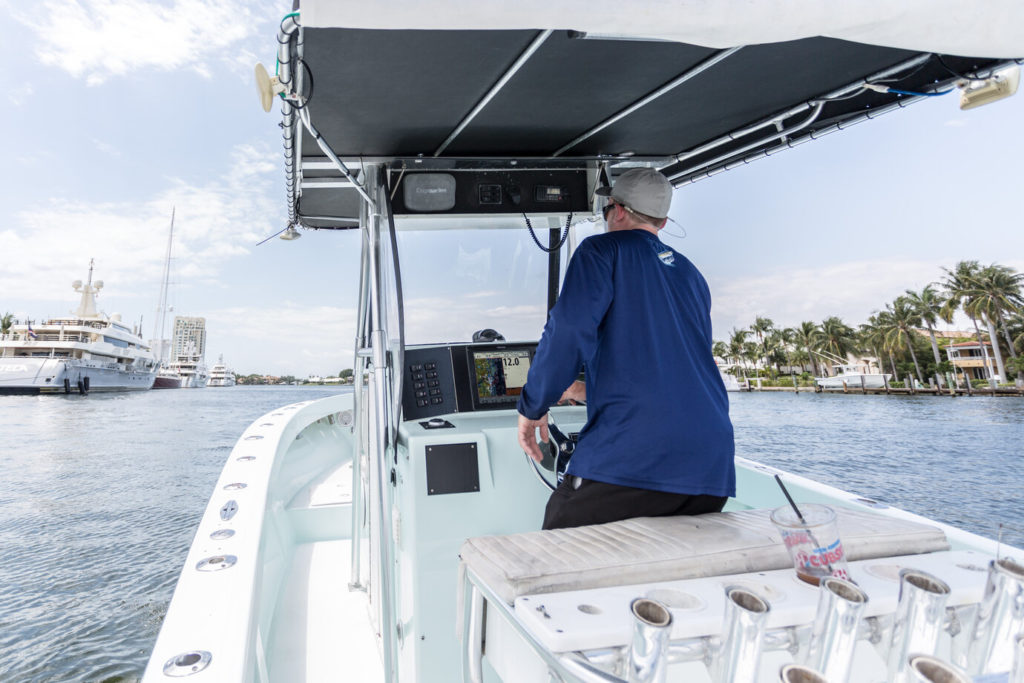
Our aim is to help people go fishing without a fuss. That’s why a good record of committing to the requests we send you will set you up to succeed in a big way. The question is, how exactly do successful trips help your listing?
They Improve Your Reliability Score
The reliability score is a really important part of how we promote and rank listings in search results. We want to recognize captains who stick to their commitments to customers by taking them fishing when the conditions allow.
Having a trip declined or canceled because of an inaccurate calendar provides a bad experience for customers. That’s why your reliability score drops if you have a long history of not being able to take people fishing due to things like getting double booked.
💡It’s important to know that the reliability score is a new name for an old concept. We always tracked the reasons behind canceled and declined trips to form our rankings, we just didn’t give it a name. This, understandably, made the reliability score easily confused with the realization rate.
To learn more about the reliability score and how it affects your listing’s ranking, check out our in-depth article about ranking factors.
They Boost Your Realization Rate
The realization rate is the percentage of your total bookings that actually become trips. It works pretty simply: whenever a trip goes ahead, it goes up. Whenever it gets canceled or declined, it goes down.
While the realization rate doesn’t influence your position in the rankings, it is an important indicator of how committed you are to completing your trips. In the past, it even served as one of the Angler’s Choice award criteria.
Nowadays, however, it’s your reliability score instead that’s used as one of the benchmarks that determine who wins the award. This way, trip cancellations that were out of your control, such as those due to bad weather, bear no influence on whether you’ll ultimately win Angler’s Choice.
Still, the realization rate is there to help you track how many potential customers end up being able to fish with you. The more this happens, the more return customers and reviews you’re likely to get, and the stronger your business!
How to Boost Your Realization Rate and Keep Your Customers

If you’ve ever made an online purchase, we’re guessing that getting what you ordered was the main thing you wanted. Your customers are no different.
Over the years, we’ve helped hundreds of thousands of anglers find a captain to fish with. With experience, we’ve come to realize that the most successful captains on FishingBooker aren’t prolific by accident. The key is – you guessed it – a high realization rate.
Let’s cover some of the key steps you can take to boost your realization rate. To give you a better idea of what this looks like in real life, we’ll also give a few examples of good and bad practices.
Foster Communication
One of the biggest mistakes newbie captains make is thinking that their trip starts when the customer steps aboard. If you’ve been in this business long enough, you know that communicating early and often is just as important as hitting the right fishing spot.
- Get in touch as soon as you can – customers who communicate with their captain ahead of time are less likely to cancel.
- Set expectations early – customers who know what they’re getting into are more likely to leave a good review.
The Instant Messaging feature lets you do this easily, whether it’s on your app, or from your computer. All your booking details are here, too, so there’s no need to dig up old notes!

Alright, let’s look at an example.
John books a full day for summer – awesome! What will you do?
Good practice:
You reach out as soon as you can and learn that John wants to target Snapper. Only, Snapper season is closed that day. You offer to reschedule for the week before and:
a) You guys agree to reschedule and fish for Snapper – success!
b) John’s unable to reschedule, but he’s up for catching something else – success!
c) John’s unable to reschedule, and he only wants to catch Snapper – John cancels the trip.
While success is not guaranteed, you’ve given yourself a much better chance of keeping John as a customer by being proactive and reaching out early.
Bad practice:
You reach out to John a day before the trip. John wants to go for Snapper, but the season is already closed. Since you only learned about this now, you don’t have an alternative date to offer anymore:
a) John’s up for catching something else – success (but you run the risk of a bad review for not being proactive and setting John’s expectations early).
b) John only wants to catch Snapper – John cancels the trip.
Not reaching out ahead of time robs you of important opportunities. You’re much less likely to keep your booking, and even if you manage to do so, you risk a bad review for not providing the best experience.
Update Your Calendar
We can’t stress this enough. Regularly updating your calendar will make the biggest difference to your listing’s success. Awesome pictures will do you little good if you’re forced to decline trips due to inaccurate availability.
Did you know that the most successful captains on FishingBooker update their calendars frequently? In the off-season, that’s usually two or three times per week. During the high season, it’s best to update your calendar daily, as bookings can come in at any time.
Thankfully, doing so takes no time at all. With just a few taps, you can set your availability right on your app. Soon, you’ll even be able to sync your profile to your Google and Apple calendars – easy breezy!
Time for another example.
You’re coming back from a charter, when, all of a sudden, your engine breaks down. You’re able to make it to the dock, but it looks like you’re in for a repair.
What will you do?
Good practice:
As soon as you’ve parked the boat, you use your app to block as many days you think a worst case repair would take. You then contact your mechanic to make an appointment.
Once you learn how long your boat will be out of the water, you take a moment to readjust your availability. If, for some reason, the mechanic is not able to help you right away, the extra second of time you invested earlier protected you from a needless cancellation.
Bad practice:
You park the boat, and decide to close the calendar after you’ve talked to the mechanic.
Life happens, and the whole list of things that could get in the way before you get to update your calendar is a pretty long one. The bottom line is this – why risk a canceled trip when you can update your availability in a matter of seconds?
Besides, if a customer looks at your listing, they’ll still be able to see your next available date. If what they see is accurate, you’ll be that much closer to a new booking.
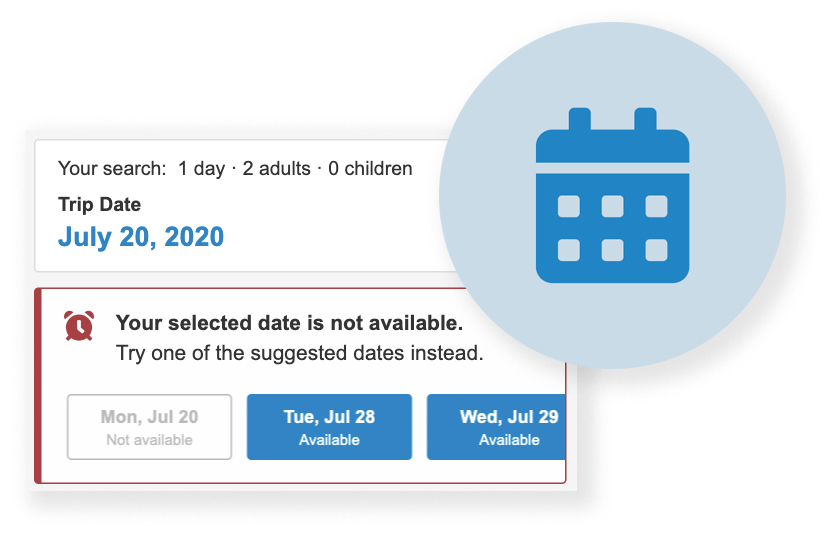
When You Can’t Make It – Try to Reschedule
Talking to your customer ahead of time takes care of a lot of uncertainties. But, as you know, things can come up at the last minute, meaning you’re not able to fulfil your booking. The good thing is that, if the unexpected happens, you no longer have to cancel.
Instead, you can get in touch with your customer to agree on a different date. Once you’ve done that, you can simply put in a booking change request and reschedule your customer for another day.
It’s important for you and the customer to agree on any booking changes before you make the change request. That way, you’ll give your customer a much better experience, not to mention a better chance of seeing the booking go through.
You and your customers can use the change booking feature to change the trip date, departure time, and size of the group you’re taking out. Soon, you’ll even be able to change bookings that require a price change.
There will always be an inflexible customer here and there, but consistently offering alternatives instead of canceling or declining a trip outright will make a huge difference in the long run. In fact, captains who change their bookings instead of canceling them increase their realization rate by 11.83%!
Enable Instant Book
Instant Book is one of our most popular features, and for good reason. Not having to confirm every booking request saves you time and lets you focus on fishing. For customers, getting an instantly-confirmed booking provides that extra feeling of security.
It makes sense then, that listings with Instant Book get up to three times as many bookings as regular listings. But that’s not all. Trips booked through Instant Book are also 13% more likely to take place. Oh, and did we mention that Instant Book gives you a ranking boost?
At the risk of sounding like a broken record, Instant Book only works if you’ve done the most important thing first, and that’s updating your calendar. The feature brings a lot of benefits, but know that if you cancel an Instant Book trip due to incorrect availability, your ranking will take a hit.
And that brings us to our next tip.
Check Your Advance Notice Settings
Having instant confirmation for your bookings is awesome but, sometimes, you need some flexibility. Thankfully, there are a couple of tricks you can use to make things work for you.
Trick #1
You can set how many days of advance notice you need in order to get a booking. If you don’t have Instant Book, this will apply to all of your bookings.
If you’ve enabled Instant Book, you can do one of two things:
- Only allow customers to book if the trip date is a certain number of days in the future. In this case, customers won’t be able to request a booking within your short notice period and all your bookings will automatically get accepted.
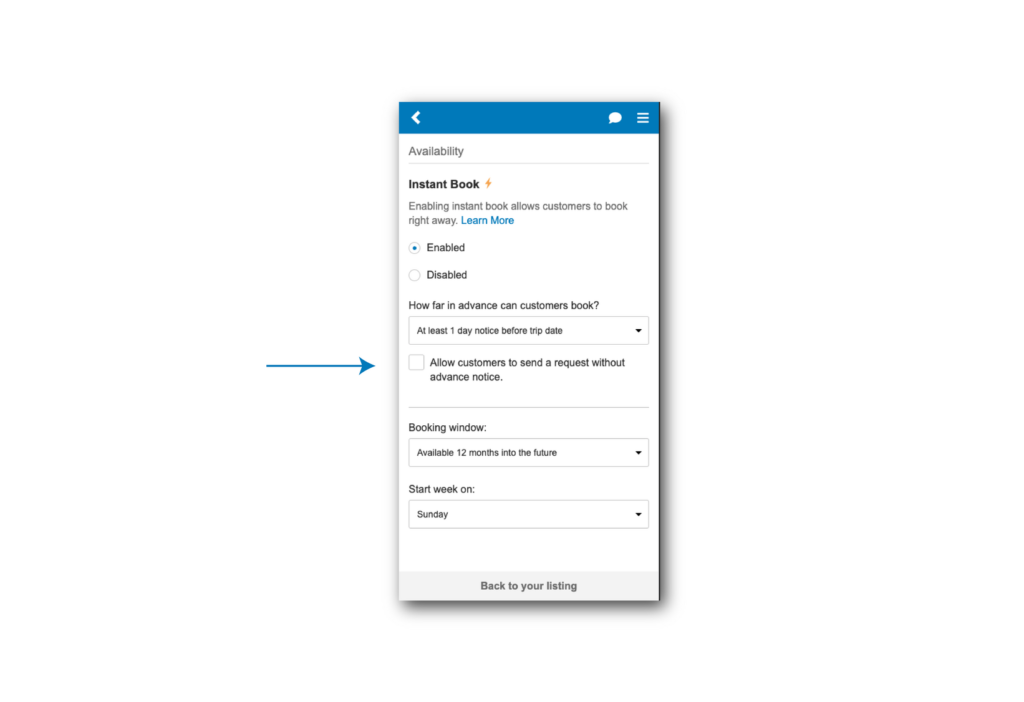
- As well as getting instant bookings, you can choose to receive short notice booking requests that you need to manually approve. This means that you can still receive last minute requests if the date is open on your calendar, but your realization rate will be affected if you can’t accept them.
To avoid dropping your realization rate with last minute requests, try only allowing Instant Bookings with a 1–2 day threshold. See how things go – if you feel comfortable with handling booking requests with less notice, you can always change the short notice setting to your liking.

Trick #2
You can customize how far in advance people can book you. This can be really useful if you’re running a seasonal charter business. You can set your booking window 3, 6, 9, or 12 months in the future, or choose a custom date range.
Custom date ranges work for individual trips, too. That means you can set custom seasonality for your packages according to the regulations for a certain species. Check out this article to learn more.
The Keys to Success
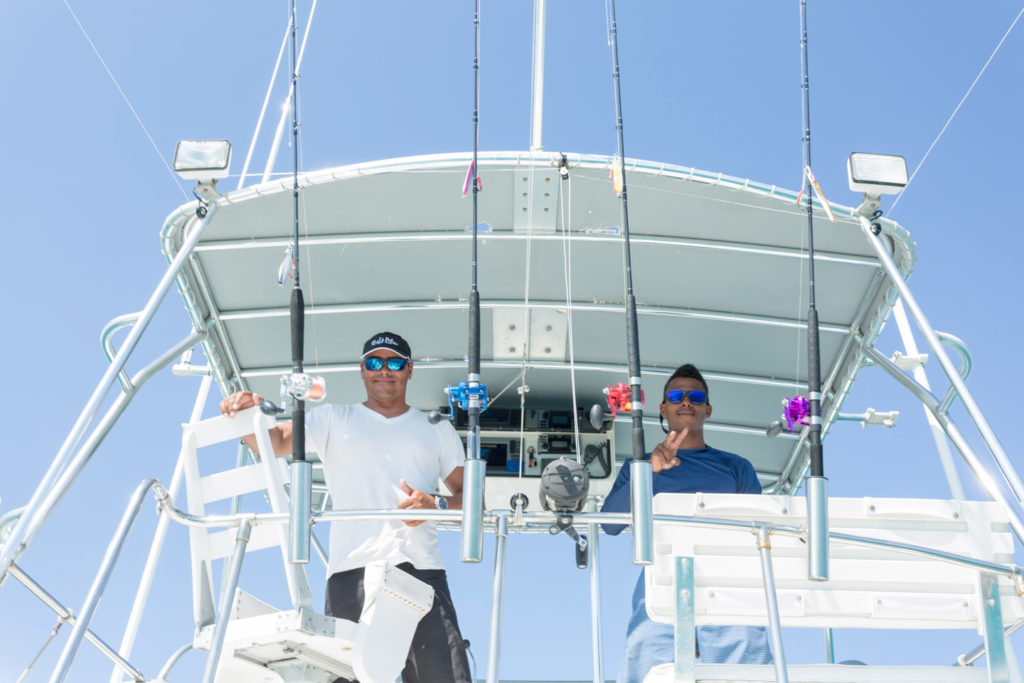
Completing trips can do wonders for your FishingBooker listing and your business as a whole. And achieving this is now easier than ever! We hope that this article helped you figure out exactly what you can do to boost the realization rate and help your business grow.
Whether you want to make a change to your listing or update your calendar, you can do so in a matter of seconds. If you need to decline a booking, you can easily offer an alternative day without losing the customer. If something comes up later on, you can ask the customer to change the booking without needing to cancel.
And that sums it up. Do you have any questions about the realization rate? Anything else you’d like to know about? Drop us a question in the comments, we always like hearing from you!
